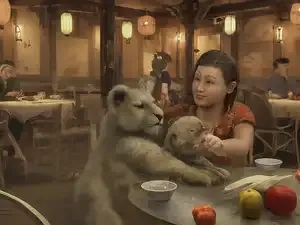A restaurant in northern China has drawn widespread criticism for allowing customers to cuddle lion cubs as part of a luxury afternoon tea experience, according to a TOI report.
The offering has triggered fierce backlash from animal rights groups and social media users who describe it as unethical and hazardous.
For 1,078 yuan (around $150), patrons can not only sip tea but also hold lion cubs and interact with other animals such as deer, llamas, and turtles, TOI reported.
The experience has quickly gained popularity, with the restaurant reportedly selling around 20 tickets per day. Footage of guests posing with lion cubs has spread rapidly on platforms like WeChat and Weibo, fuelling online outrage.
“This is not a harmless photo-op—it’s the exploitation of a baby animal who should be with its mother,” said Jason Baker, Senior Vice President of PETA. He denounced the trend of turning animals into props for online content, saying, “These cubs are being treated as nothing more than accessories for social media.”
The report said that Peter Li, a policy specialist on China at Humane World for Animals, also condemned the practice. “Handling wild animals, even at a young age, carries real danger. A frightened or stressed lion cub can still injure someone,” he said. “Beyond safety, it’s deeply irresponsible and unethical.”
Despite this assurance, criticism continues to grow, with many questioning the legality and morality of using wildlife in commercial dining settings.
These incidents have intensified calls for stricter oversight and animal welfare regulations in China’s tourism and hospitality industries, with activists urging authorities to clamp down on the use of wildlife as entertainment.
The offering has triggered fierce backlash from animal rights groups and social media users who describe it as unethical and hazardous.
Exotic animals meet fine dining
Situated in Taiyuan City in Shanxi province, the Wanhui restaurant rolled out the controversial experience in June, combining a four-course tea set with up-close encounters with wild animals.For 1,078 yuan (around $150), patrons can not only sip tea but also hold lion cubs and interact with other animals such as deer, llamas, and turtles, TOI reported.
The experience has quickly gained popularity, with the restaurant reportedly selling around 20 tickets per day. Footage of guests posing with lion cubs has spread rapidly on platforms like WeChat and Weibo, fuelling online outrage.
Experts slam the practice as cruel & dangerous
Animal protection organisations have strongly opposed the offering, warning that using young animals for entertainment compromises their well-being and puts people at risk.“This is not a harmless photo-op—it’s the exploitation of a baby animal who should be with its mother,” said Jason Baker, Senior Vice President of PETA. He denounced the trend of turning animals into props for online content, saying, “These cubs are being treated as nothing more than accessories for social media.”
The report said that Peter Li, a policy specialist on China at Humane World for Animals, also condemned the practice. “Handling wild animals, even at a young age, carries real danger. A frightened or stressed lion cub can still injure someone,” he said. “Beyond safety, it’s deeply irresponsible and unethical.”
Restaurant stands by its offer
Responding to the backlash, a representative from the Wanhui restaurant claimed that the cubs are being well looked after by trained handlers. “They are receiving professional care, and we are ensuring their safety and comfort,” the spokesperson said.Despite this assurance, criticism continues to grow, with many questioning the legality and morality of using wildlife in commercial dining settings.
Similar incidents fuel concern
The controversy comes just weeks after another hotel in Chongqing faced public outrage and an official probe for using red pandas in a “wake-up call” service—where the animals were allowed to climb onto guests’ beds in the morning.These incidents have intensified calls for stricter oversight and animal welfare regulations in China’s tourism and hospitality industries, with activists urging authorities to clamp down on the use of wildlife as entertainment.








